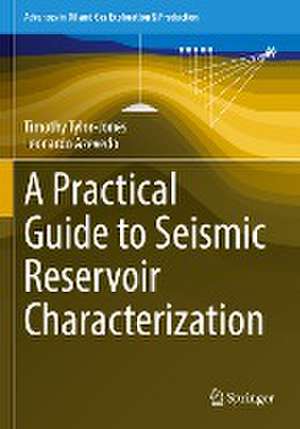A Practical Guide to Seismic Reservoir Characterization: Advances in Oil and Gas Exploration & Production
Autor Timothy Tylor-Jones, Leonardo Azevedoen Limba Engleză Paperback – 12 ian 2024
This book covers in detail the entire workflow for quantitative seismic interpretation of subsurface modeling and characterization. It focusses on each step of the geo-modeling workflow starting from data preconditioning and wavelet extraction, which is the basis for the reservoir geophysics described and introduced in the following chapters. This book allows the reader to get a comprehensive insight of the most common and advanced workflows. It aims at graduate students related to energy (hydrocarbons), CO2 geological storage, and near surface characterization as well as professionals in these industries. The reader benefits from the strong and coherent theoretical background of the book, which is accompanied with real case examples.
| Toate formatele și edițiile | Preț | Express |
|---|---|---|
| Paperback (1) | 583.45 lei 6-8 săpt. | |
| Springer International Publishing – 12 ian 2024 | 583.45 lei 6-8 săpt. | |
| Hardback (1) | 733.46 lei 6-8 săpt. | |
| Springer International Publishing – 12 ian 2023 | 733.46 lei 6-8 săpt. |
Din seria Advances in Oil and Gas Exploration & Production
-
 Preț: 458.30 lei
Preț: 458.30 lei - 18%
 Preț: 1261.14 lei
Preț: 1261.14 lei -
 Preț: 465.21 lei
Preț: 465.21 lei - 19%
 Preț: 430.26 lei
Preț: 430.26 lei - 18%
 Preț: 972.62 lei
Preț: 972.62 lei - 18%
 Preț: 1013.02 lei
Preț: 1013.02 lei - 15%
 Preț: 701.25 lei
Preț: 701.25 lei - 18%
 Preț: 730.16 lei
Preț: 730.16 lei - 18%
 Preț: 1385.54 lei
Preț: 1385.54 lei - 15%
 Preț: 633.84 lei
Preț: 633.84 lei - 20%
 Preț: 565.64 lei
Preț: 565.64 lei - 18%
 Preț: 996.78 lei
Preț: 996.78 lei -
 Preț: 378.34 lei
Preț: 378.34 lei - 15%
 Preț: 645.47 lei
Preț: 645.47 lei - 18%
 Preț: 890.54 lei
Preț: 890.54 lei
Preț: 583.45 lei
Preț vechi: 686.42 lei
-15% Nou
Puncte Express: 875
Preț estimativ în valută:
111.68€ • 121.35$ • 93.87£
111.68€ • 121.35$ • 93.87£
Carte tipărită la comandă
Livrare economică 21 aprilie-05 mai
Preluare comenzi: 021 569.72.76
Specificații
ISBN-13: 9783030998561
ISBN-10: 3030998568
Pagini: 202
Ilustrații: XXIII, 202 p. 125 illus., 99 illus. in color.
Dimensiuni: 178 x 254 mm
Greutate: 0.4 kg
Ediția:1st ed. 2022
Editura: Springer International Publishing
Colecția Springer
Seria Advances in Oil and Gas Exploration & Production
Locul publicării:Cham, Switzerland
ISBN-10: 3030998568
Pagini: 202
Ilustrații: XXIII, 202 p. 125 illus., 99 illus. in color.
Dimensiuni: 178 x 254 mm
Greutate: 0.4 kg
Ediția:1st ed. 2022
Editura: Springer International Publishing
Colecția Springer
Seria Advances in Oil and Gas Exploration & Production
Locul publicării:Cham, Switzerland
Cuprins
List of acronyms.- Acknowledgements.- Chapter 1 Introduction.- Chapter 2 The seismic method.- Chapter 3 Seismic acquisition essentials.- Chapter 4 Seismic pre-conditioning.- Chapter 5 Seismic well ties and wavelets.- Chapter 6 Interpreting seismic amplitudes.- Chapter 7 Predicting subsurface properties from seismic data.- Chapter 8 Rock properties prediction.- Chapter 9 The way forward.- References.
Notă biografică
Timothy Tylor-Jones is a professional geophysicist with more than 20 years of experience in the energy industry. He has a B.Eng. in Geology from Camborne School of Mines (Exeter University) and a M.Sc. in Petroleum Systems from the University of Newcastle upon Tyne. He is also a chartered geologist with the Geological Society of London and a certified petroleum geologist with the American Association of Petroleum Geologists. Tim’s early career was spent at Rock Solid Images as a geophysicist involved in processing and inversion of controlled source electromagnetics. Subsequently, he moved to Fugro Jason and then Baker RDS as a specialist geophysicist in seismic inversion, seismic processing, AVO, and reservoir characterization. Tim joined Maersk Oil in 2012 working both exploration and operated assets in the North Sea, which was followed by positions at DownUnder GeoSolutions as a lead QI geophysicist and then a global QI technical manager. He currently works at bp as a senior geophysicist in global exploration and development projects for natural gas.”
Leonardo Azevedo is an assistant professor at the Instituto Superior Técnico, Universidade de Lisboa, Portugal. He received his Ph.D. in Georesources in 2013 in the same university where he developed geostatistical tools for inverting seismic reflection data. He teaches and does research in topics related to geophysical inversion, subsurface modeling and characterization, and spatial data science. His work has been published in several international peer-reviewed journals and is a co-author of the book ‘Geostatistical methods for reservoir geophysics’.
Textul de pe ultima copertă
This book covers in detail the entire workflow for quantitative seismic interpretation of subsurface modeling and characterization. It focusses on each step of the geo-modeling workflow starting from data preconditioning and wavelet extraction, which is the basis for the reservoir geophysics described and introduced in the following chapters. This book allows the reader to get a comprehensive insight of the most common and advanced workflows. It aims at graduate students related to energy (hydrocarbons), CO2 geological storage, and near surface characterization as well as professionals in these industries. The reader benefits from the strong and coherent theoretical background of the book, which is accompanied with real case examples.
Caracteristici
Contains numerous applications examples Provides detailed workflows on how to apply seismic inversion methods Comprises an extensive review of the leading edge methods
